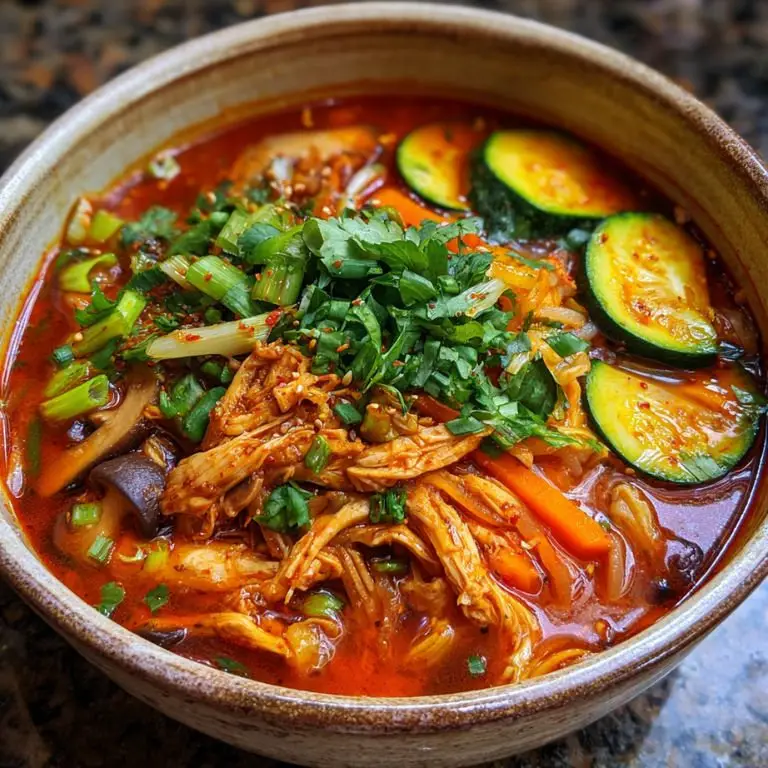There’s something incredibly comforting about a steaming bowl of spicy chicken soup, especially when it’s brimming with bold flavors and vibrant vegetables. Korean Gochujang Chicken Soup with Vegetables is my go-to when I need a nourishing pick-me-up with a serious flavor kick. The gochujang — a Korean fermented chili paste — brings heat and depth, while tender chicken and a rainbow of vegetables make it hearty and satisfying. If you’re a fan of spicy soup recipes or looking for healthy spicy soup recipes that are still rich and comforting, this one deserves a spot in your rotation. Think of it as the Korean cousin of dishes like mama mandola's Sicilian chicken soup or even carabbas chicken noodle soup — familiar in comfort, but excitingly different in flavor.
Korean Gochujang Chicken Soup with Vegetables
Prep Time 20 minutes mins
Cook Time 40 minutes mins
Total Time 1 hour hr
Course Main Course
Cuisine Korean
Servings 4 generous bowls
Large soup pot or Dutch oven A 5-6 quart capacity pot is ideal. If you don’t have a Dutch oven, any heavy-bottomed pot will work.
Cutting board and sharp knife For prepping all your vegetables and chicken.
Wooden Spoon or Spatula To stir and sauté without damaging the pot.
Soup ladle For easy serving.
Tongs or slotted spoon Useful for pulling out the chicken before shredding.
For the Soup
- 1 lb boneless skinless chicken thighs (or chicken tenders if preferred)
- 1 tablespoon sesame oil
- 1 tablespoon neutral oil like canola or vegetable
- 1 medium yellow onion sliced thin
- 3 cloves garlic minced
- 1 tablespoon fresh ginger minced
- 2 tablespoons gochujang Korean red chili paste
- 1 tablespoon soy sauce
- 1 tablespoon fish sauce
- 1 teaspoon sugar optional, balances the heat
- 6 cups low-sodium chicken broth
- 1 cup napa cabbage chopped
- 1 large carrot julienned or thinly sliced
- 1 zucchini sliced
- 4 oz shiitake mushrooms stems removed and sliced
- 1 cup bean sprouts
- 2 scallions chopped for garnish
- Fresh cilantro optional, for garnish
- Salt and pepper to taste
Optional Add-ins
- Cooked ramen noodles or rice noodles turns this into a spicy noodle soup
- Soft-boiled egg
- Kimchi on the side
Step 1: Sauté the Aromatics
In a large pot, heat the sesame oil and neutral oil over medium heat. Add the sliced onion and cook for about 5 minutes until it starts to soften. Then add the garlic and ginger, stirring constantly for 1-2 minutes until fragrant.
Step 2: Add the Flavor Base
Stir in the gochujang paste. Cook it out for about a minute so it gets slightly caramelized — this intensifies the flavor. Add soy sauce, fish sauce, and sugar (if using), then stir everything together until the mixture becomes a thick, aromatic paste.
Step 3: Add Chicken and Broth
Nestle the chicken thighs into the pot and pour in the chicken broth. Bring to a gentle boil, then lower the heat and let it simmer uncovered for about 20 minutes, or until the chicken is fully cooked and tender.
Step 4: Shred the Chicken
Remove the chicken with tongs and shred it using two forks. It should come apart easily. Return the shredded meat to the soup.
Step 5: Add the Vegetables
Now stir in the napa cabbage, carrots, zucchini, and mushrooms. Simmer for another 10-12 minutes until the vegetables are tender but still vibrant.
Step 6: Final Touches
Add bean sprouts just before serving for a bit of crunch. Taste and adjust seasoning with salt and pepper. Garnish with chopped scallions and cilantro if desired.
Optional: Make it a Noodle Soup
If you're turning this into a spicy noodle soup, cook your noodles separately and add them to each bowl before ladling the soup over the top. This keeps the noodles from soaking up too much broth and getting mushy.
Pairings
Korean Gochujang Chicken Soup pairs wonderfully with:
- Steamed white rice: Keeps it simple and lets the soup shine.
- Kimchi or pickled radish: Adds acidity to balance the heat and richness.
- Korean vegetable pancakes (Pajeon): Crispy and savory, great for dipping.
- Chilled barley tea or ginger tea: Soothing and complements the spice.
It’s also a great soup to serve alongside lighter dishes if you’re hosting — think small plates like cucumber salad or sesame tofu.
FAQs
1. What type of chicken should I use for this soup?
Boneless, skinless chicken thighs are the best option because they stay tender and shred beautifully. That said, chicken tenders or chicken breasts can work if you want a leaner option. Just be careful not to overcook them.
2. Can I make this vegetarian?
Yes! Replace the chicken with extra-firm tofu, and swap the chicken broth for a rich vegetable broth. You can still use gochujang and soy sauce for umami. For even more depth, toss in a bit of miso paste or mushroom powder.
3. Is this soup good for colds?
Absolutely — this is spicy chicken soup for colds done right. The gochujang helps clear sinuses, the garlic and ginger are anti-inflammatory, and the vegetables give you much-needed nutrients. It’s one of those spicy chicken soup recipes you’ll crave when under the weather.
4. How spicy is it?
It’s got a noticeable kick, but it’s not overpowering. If you’re sensitive to spice, start with 1 tablespoon of gochujang and increase as needed. On the flip side, if you love fiery heat (like in Catherine's spicy chicken soup or other bold spicy vegetable soup recipes), you can add a chopped chili or a dash of Korean red pepper flakes.
5. Can I meal prep or freeze this soup?
Yes. This soup holds up well in the fridge for 4-5 days and freezes beautifully without the noodles. If you plan to freeze it, leave out bean sprouts and fresh herbs — add those after reheating.
